

Smart cities make two fundamental promises: lots of data, and automated decision making based on that data. The ultimate smart city will require a raft of existing and to-be-invented technologies, from sensors to robots to artificial intelligence. For many this promises a more efficient, equitable city; for others, it raises questions about privacy and algorithmic bias. — New York Times
Promises for a better, smarter city have flooded media headlines, but if these so-called "smart cities" are said to be the answer, can the general public adapt to these infrastructure dreams? In a recent piece by Shoshanna Saxe for the New York Times, the experienced civil and mineral engineer at the University of Toronto shares her perspectives on the matter.
In her op-ed piece "Im an Engineer, and I'm Not Buying into 'Smart' Cities", Saxe sheds a detailed response to smart city dreams. For one thing, "they will be exceedingly complex to manage, with all sorts of unpredictable vulnerabilities. There will always be a place for new technology in our urban infrastructure, but we may find that often, “dumb” cities will do better than smart ones."
Saxe continues to add that with the rapid rate of technology turnover and disruption, could city residents deal with these types of technical disruptions when it comes to water and power services?
"City infrastructure, especially in high-income countries, is designed to last decades or centuries and must always work. Bridges are built to last 100 years, tunnels longer. New technology in 2015 will be outdated before 2020. If we widely deploy smart tech in cities, we need to be prepared to replace it every few years, with the associated disruption and cost. But who will assume those costs?"
What I found most poignant about Saxe's piece were her closing remarks to the article. Instead of looking to transform every city into a shiny new metropolis of tech, perhaps more effort should be focused on building better "dumb cities." Saxe closes with, "As we consider the city of the 21st century, we do well to remember that the things we love most about cities — parks, public spaces, neighborhood communities, education opportunities — are made and populated by people, not technology. Tech has a place in cities, but that place is not everywhere."
No Comments
Block this user
Are you sure you want to block this user and hide all related comments throughout the site?
Archinect
This is your first comment on Archinect. Your comment will be visible once approved.